Kirk O’Riordan, conductor
Katie Rice ’21, guest conductor
Saturday, December 10, 2022
Williams Center for the Arts
Thank you for supporting music at Lafayette College!
As a courtesy to the performers and your fellow patrons, please silence all cell phones, pagers, watches, and other electronic devices before the performance begins. Please also try to read these notes before the concert, during intermission, or between pieces. Also…if you are reading this during the performance, please dim the back lighting on your device so as to not disturb others.
Photography and recording of any kind are not permitted during the performance.
No food or drink is permitted in the theater.
Program and Program Notes
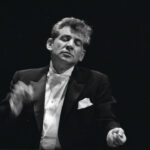 Leonard Bernstein (1918 – 1990)
Leonard Bernstein (1918 – 1990)
Overture to “Candide” (1956, 1986)
Transcribed by Clare Grundman
Flute Soloists: Emma Hartman, Brianna Leopold
Composed in 1956, the Overture to the comic operetta Candide has become a staple of both the orchestra and wind ensemble repertories. The five-minute work is based on several arias, including “Oh, Happy We” (the lyrical second theme of the overture) and the virtuosic “Glitter and Be Gay.”
Conductor’s Note:
I adore this piece. From a pedagogical perspective, it checks every box: difficult technical challenges, lyricism, polyrhythms and polymeter, large tutti textures contrasted with thinly scored solo sections. It is professional-level music that is not easy even for professionals. It teaches ensembles how to play fast and light, nimble on their feet; how to trust yourself when you are one of two people playing notes in a section. It puts exactly the right kind of stresses on an ensemble.
And it is So. Much. Fun.
As a conductor, Leonard Bernstein has probably been my biggest influence. While one may not go to him for clarity of beat patterns (not that he couldn’t do that when needed), few conductors are more clear with how they use their bodies to physically manifest the core of what is important about the music than was Bernstein. Watching him conduct this piece tells us so much about what he feels is important about music and music making.
 David Maslanka (1943 – 2017)
David Maslanka (1943 – 2017)
Requiem (2013)
Piano Soloist: Manaka Gomi
Flute Solist: Brianna Leopold
Clarinet Soloist: Ryan Wedeking
Requiem is a single-movement fantasia written in response to an event of the Holocaust in World War II. It is not possible truly to grasp the deaths of millions of people, but the death of one, in this case a year-old baby – brought me face-to-face with the horror and revulsion of the whole. We think that history is past, and nothing can change it. But the effects of such things as the Holocaust are still immediately with us; the open wound has not been healed. It is my feeling that music can bring closure, and it is my hope that Requiem will serve in this capacity.
A Requiem is a Mass for the dead. This relatively brief instrumental piece with the title Requiem is not a Mass, but serves a parallel function – the need to lay to rest old things in order to turn the mind and heart toward the new.
I have an abiding interest in why humans go to war. I have recently read much about World War II, and was confronted once again with the awful fact of fifty million needless deaths. Shostakovich thought of every one of his compositions as a tombstone, and wished that he could have written a separate memorial piece for every person who died in war.
I do believe that we are in a major transitional time, and that this transition happens first in each of us. My Requiem is both for the unnamed dead of all wars, and for each person making their own inner step, saying goodbye in order to say hello.
—David Maslanka
Conductor’s Note:
I was fortunate to have had one composition lesson with David at his ranch in Missoula, Montana while visiting to attend my brother’s wedding. At that time we hadn’t met before, but I was already very much a fan, having performed a few of his works in bands as a student and having studied his sonata for alto saxophone and piano (one of my absolute favorites in any genre). Our meeting was incredibly intense and extremely productive…one of those lessons where time stops and you realize where you are hours later when your father comes to pick you up for your tuxedo fitting. As a human being, David was among the most gracious and kind people I have known.
That his music is filled with such intensity at first seems in contradiction to how I have described him. But I don’t think that is true. I think that he, like all great artists, felt things in a very profound way and was able to translate those emotions into the kinds of sounds that not only carry that intensity but also do so in a way that is simultaneously beautiful and idiomatic for the medium. I think Requiem is a quintessential example of this.
 Omar Thomas (b. 1982)
Omar Thomas (b. 1982)
Shenandoah (2019)
Shenandoah is one of the most well-known and beloved Americana folk songs. Originally a river song detailing the lives and journeys of fur traders canoeing down the Missouri River, the symbolism of this culturally-significant melody has been expanded to include its geographic namesake – an area of the eastern United States that encompasses West Virginia and a good portion of the western part of Virginia – and various parks, rivers, counties, and academic institutions found within.
Back in May of 2018, after hearing a really lovely duo arrangement of Shenandoah while adjudicating a music competition in Minneapolis, I asked myself, after hearing so many versions of this iconic and historic song, how would I set it differently? I thought about it and thought about it and thought about it, and before I realized it, I had composed and assembled just about all of this arrangement in my head by assigning bass notes to the melody and filling in the harmony in my head afterwards. I would intermittently check myself on the piano to make sure what I was imagining worked, and ended up changing almost nothing at all from what I’d heard in my mind’s ear.
This arrangement recalls the beauty of Shenandoah Valley, not bathed in golden sunlight, but blanketed by low-hanging clouds and experiencing intermittent periods of heavy rainfall (created with a combination of percussion textures, generated both on instruments and from the body). There are a few musical moments where the sun attempts to pierce through the clouds, but ultimately the rains win out. This arrangement of Shenandoah is at times mysterious, somewhat ominous, constantly, constantly introspective, and deeply soulful.
–Omar Thomas
Conductor’s Note:
We have really loved working on this piece. The harmonies are lush and evocative, influenced by Big Band-style voicings and governed by an impeccable sense of balance between instrument groups. While the melody is always quite evident, Thomas stretches it metrically, distorting the familiar rhythms of the original in much the same way as a memory gets distorted over time.
Our performance tonight will require some audience participation. At points in the piece (near the middle, and at the end) you will see members of the ensemble snapping their fingers…an effect that beautifully replicates the sounds of a gentle rainfall. Please join us and snap your fingers with us, and continue until sunset.
–Intermission–
 Karel Husa (1921 – 2016)
Karel Husa (1921 – 2016)
Smetana Fanfare (1984)
Smetana Fanfare for Wind Ensemble was commissioned by the San Diego State University for the 1984 Festival of Music honoring the Czech composer Bedrich Smetana. It was first performed on April 3, 1984, in San Diego by the SDSU Wind Ensemble, on the occasion of the centennial celebration of Smetana’s death. This short work uses two excerpts from Smetana’s symphonic poem The Wallenstein’s Camp, completed in 1859 in Goteberg, Sweden, during his exile from Prague.
–Karel Husa
Conductor’s Note:
Far and away the most “modern” piece on tonight’s program, Husa’s Smetana Fanfare offers us a short glimpse into a unique harmonic language that simultaneously combines elements of tonal lyricism, free and serial atonality, and intense rhythmic complexity. Most known for his masterpieces, Music for Prague 1968 (a work LCCB has performed on its May 2011 concert and hopefully will again soon) and Apotheosis of This Earth, Husa is a Pulitzer Prize-winning composer who was uniquely able to combine post-modern aesthetic sensibilities with nationalist themes and advocacy. This is a short but provocative work that serves as a wonderful introduction to this incredible composer’s language.
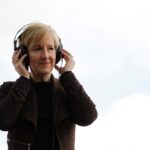 Alexandra Gardner (b. 1967)
Alexandra Gardner (b. 1967)
Perseids (2015)
Katie Rice ’21, conductor
The Perseids are a meteor shower visible in the Northern Hemisphere during the months of July and August. Each year at that time, the earth passes through a cloud of debris left from the Comet Swift-Tuttle, creating a prolific display of natural fireworks as the rubble enters the earth’s atmosphere and burns through the sky. For the past several years, a group of friends and I have taken a summertime trip to Ocracoke Island in North Carolina, where we spend hours every night watching this natural display of fireworks from a crow’s nest deck. Far from city lights, it is possible to see deeply into the night sky, which is punctuated by “shooting stars” from every direction.
I am fascinated by the idea of the sky as time machine — that most of what we are seeing is infinitely old, because the light from those stars has been traveling for eons. By the time it reaches our eyes, the star may have transformed completely, or it might not exist at all. Perhaps this is why the fleeting sight of a meteor feels like a special event: it is science of the present moment.
The music of Perseids draws upon experiences of those nighttime sky-watching sessions — the glowing band of the Milky Way, pulsing satellites moving quickly across the sky, constellations and layers of clouds, and of course, plenty of shooting stars. Beginning with slow, overlapping layers of sound underneath a melody that works its way through the wind instruments, the music gradually coalesces into a vigorous, celebratory verse-chorus song structure.
–Alexandra Gardner
Conductor’s Note:
It has been a joy to conduct Perseids with the Lafayette College Concert Band. The piece begins with soft swell chords with lyrical soloists, then breaks into a dance-like groove. This music is a ton of fun and the players have risen to meet the challenges of soloist playing and interlocking rhythms and textures.
On a personal note, I am thrilled to be back at Lafayette College to make my LCCB debut in front of a live audience. I made my virtual debut as the student conductor of LCCB in the spring of 2021 and it is wonderful to experience live performance with the band again. Performing Perseids with this ensemble is like a big celebration with my friends and family. Being here is incredibly special, and I’m so grateful to be home.
Special thank you to Dr. O’Riordan, the R. K. Laros Foundation, and LCCB. The members of the band are the shooting stars that Gardner describes. We hope you enjoy seeing them shine!
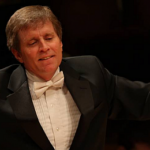 Frank Ticheli (b. 1958)
Frank Ticheli (b. 1958)
An American Elegy (2000)
Trumpet Soloist: Zach Freiheiter
Horn Solist: Michala Dennis
An American Elegy was commissioned by the Columbine Commissioning Fund, a special project sponsored by the Alpha Iota Chapter of Kappa Kappa Psi at the University of Colorado on behalf of the Columbine High School Band. Contributors to the fund included members, chapters, alumni, and friends of Kappa Kapp Psi and Tau Beta Sigma National Honorary Band Fraternity and Sorority.
The work received its premiere performance by the Columbine High School Band, William Biskup, director, Frank Ticheli, guest conductor, on April 23, 2000. Its premiere served as the centerpiece of a special commemorative concert given by the Columbine High School Band in conjunction with the University of Colorado Wind Symphony, held at Mackey Hall in Boulder, Colorado.
An American Elegy is, above all, an expression of hope. It was composed in memory of those who lost their lives at Columbine High School on April 20, 1999, and to honor the survivors. It is offered as a tribute to their great strength and courage in the face of a terrible tragedy. I hope the work can also serve as a reminder of how fragile and precious life is and how intimately connected we all area as human beings.
—Frank Ticheli
Conductor’s Note:
The Columbine shootings happened while I was a conducting student at the University of Denver, and I remember distinctly listening to the radio when the topic turned from the latest sports news to live coverage. I probably could find the exact place on I-25 even now. I was working on Copland’s Appalachian Spring at the time, and after one particularly bad rehearsal I drove to Columbine, like so many others in Denver, to pay my respects and gain some perspective.
I resisted programming this piece for a long time. On my tenth anniversary concert (May 2019), though, I chose it for a returning LCCB alumna who graduated from Columbine High School…she played the horn solos.
 Percy Grainger (1882 – 1961)
Percy Grainger (1882 – 1961)
Molly on the Shore (1921)
Clarinet Soloist: Emily Rice
In setting Molly on the Shore I strove to imbue the accompanying parts that made up the harmonic texture with a melodic character not too unlike that of the underlying reel tune. Melody seems to me to provide music with initiative, whereas rhythm appears to me to exert an enslaving influence. For that reason I have tried to avoid regular rhythmic domination in my music — always excepting irregular rhythms, such as those of Gregorian chant, which seem to me to make for freedom. Equally with melody, I prize discordant harmony, because of the emotional and compassionate sway it exerts.
—Percy Grainger
Conductor’s Note:
Not a traditional “closer” by any means, Molly on the Shore is nonetheless a great way to end a concert. I suspect these lovely melodies will stay with you on your trip home. The piece is challenging but immensely fun, and along with Lincolnshire Posy stands as one of Grainger’s best known and most performed works.
Guest Conductor
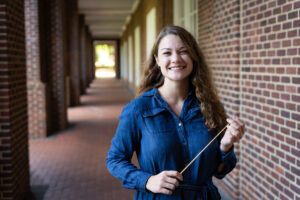
Katie Rice is currently pursuing a Master of Music degree in Conducting at the University of Delaware. She studies with Dr. Lauren Reynolds and is the Graduate Assistant for wind band activities. She is the Assistant Conductor for the University of Delaware Wind Ensemble and Symphonic Band and the Co-Director and Conductor of the University of Delaware Collegiate Band. Katie received her Bachelor of Arts in Music and Bachelor of Science in Mechanical Engineering dual degree from Lafayette College, where she studied conducting with Dr. Kirk O’Riordan. During her time at Lafayette College, she conducted research for an Honors Thesis in Music discussing the pedagogy behind conducting band, choral, and orchestral ensembles and served as the Assistant Conductor for the Lafayette College Concert Band and the Student Conductor of the Lafayette College Pep Band.
Katie’s residence was made possible by the R. K. Laros Foundation.
LCCB Roster
Flute
Brianna Leopold, Principal
Jenna Tempkin
Samantha Semsel, Associate Principal
Iris Peluso
Lauren Kaye
Emma Hartman, Piccolo
Oboe
Olivia Hoffman
Clarinet
Emily Rice, Principal
Ryan Wedeking, Associate Principal
Ashley Kushner
Priscilla Wu
Allison Ramsay
Christopher Reubeck
Sungbum Lee
Matthew Olson
William Cassidy
Darby Aurelien, Bass
Peter Rice, Bass
Bassoon
Avery Besch
Kiki Fasce
Saxophone
Ben Wenger, Principal (alto)
Noah Evan (alto)
Alex Kmetz (alto)
James Pecsok (soprano, alto)
Chloe Williams (tenor)
Caleb Fossett (baritone)
Horn
Michala Dennis
Drew Borek
Trumpet
Zach Freiheiter, Principal
Susanna Hontz
Olivia Lattanzi
Devin Arnold
William Blair
Trombone
Ryan Pignotti
Pedro dos Santos
Christopher Taverner
Tuba
Tim Paulis, Principal
Jack Kerekes
Piano
Manaka Gomi
Percussion
Ellie Batchelar, Principal, LCCB President
Jen Galdieri, Associate Principal
Henry Pappas
Manaka Gomi
Yuko Tanaka
Paul Zdankiewicz
—
Graduating Seniors
LCCB Alumni
Guest Performers
LCCB’s Conductor
Kirk O’Riordan
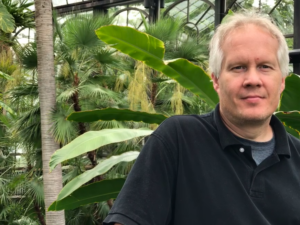 Kirk O’Riordan’s music has been referred to as “unapologetically beautiful” and is often praised for its uniquely “visual” qualities that depict a wide range of striking moods. His debut compact disk, Strange Flowers, was praised by Audiophile Audition as “one of the most impressive and beautiful collections of chamber music I have heard in awhile….This is all just so lovely and invokes exactly the emotions that good music should be able to induce in all of us.”Gramophone Magazine praised O’Riordan as “a composer for whom imagery is a defining inspiration.…[he] is a deeply sensitive composer who savours going gently into the night.” (April 2014). His recording of his Twenty-Six Preludes for Solo Piano—by pianist Holly Roadfeldt—has attracted similar praise: they “are similarly atmospheric and proceed to unfold like a magical tapestry. Each of the 26 Preludes seemingly comprising of warp and weft forming a myriad of pixels of little pictures that ultimately combines to form a moveable feast for both eye and inner ear. O’Riordan’s miniatures are informed by languorous beauty and profundity, the lyrical variations of each often feature elaborate embellishments, as well as sudden dissonant figurations that seem to mimic the gravity-defying leaps of the gazelle…” (World Music Report, April 2017)
Kirk O’Riordan’s music has been referred to as “unapologetically beautiful” and is often praised for its uniquely “visual” qualities that depict a wide range of striking moods. His debut compact disk, Strange Flowers, was praised by Audiophile Audition as “one of the most impressive and beautiful collections of chamber music I have heard in awhile….This is all just so lovely and invokes exactly the emotions that good music should be able to induce in all of us.”Gramophone Magazine praised O’Riordan as “a composer for whom imagery is a defining inspiration.…[he] is a deeply sensitive composer who savours going gently into the night.” (April 2014). His recording of his Twenty-Six Preludes for Solo Piano—by pianist Holly Roadfeldt—has attracted similar praise: they “are similarly atmospheric and proceed to unfold like a magical tapestry. Each of the 26 Preludes seemingly comprising of warp and weft forming a myriad of pixels of little pictures that ultimately combines to form a moveable feast for both eye and inner ear. O’Riordan’s miniatures are informed by languorous beauty and profundity, the lyrical variations of each often feature elaborate embellishments, as well as sudden dissonant figurations that seem to mimic the gravity-defying leaps of the gazelle…” (World Music Report, April 2017)
His most recent release, Autumn Winds, has been similarly praised. “Compositionally it seems on first blush simple at heart but as one listens the details both flesh themselves out and freshen the listening mind so that it all seems increasingly evergreen and more complex than at first might be thought.” (Gapplegate Music Review, 2020) “[O’Riordan] is not strictly speaking a minimalist, yet he possesses that rare quality of capturing a vivid musical landscape with Webern-like efficiency.” (The Morning Call).
O’Riordan (b. 1968) is an active composer, conductor, saxophonist, and teacher. His music has been performed in Canada, China, Costa Rica, Cyprus, Finland, Italy, and Russia; and in nearly all of the fifty United States. In 2009 Dr. O’Riordan joined the faculty of Lafayette College where he serves as Associate Professor of Music and Director of Bands, teaching courses in music theory, and composition. In addition, conducts the Lafayette College Concert Band and Contemporary Music Ensemble. He holds the Doctor of Musical Arts degree from Arizona State University; the Certificate of Performance in Saxophone from Northwestern University; and three Master of Music degrees. Apart from his active teaching and composing schedule, Kirk is an avid fan of obstacle course racing.
About LCCB
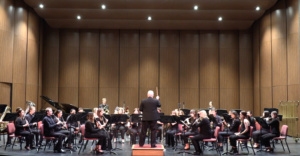
The Lafayette College Concert Band is comprised of approximately 50 students from a variety of majors who are united by a strong desire to perform the highest quality music at the height of their abilities. Participation in LCCB is open to students in any major as well as faculty and staff. The ensemble is conducted by Kirk O’Riordan, Associate Professor of Music.
LCCB typically performs one concert each semester. The repertoire is selected from traditional concert band masterpieces, newer works by established and emerging composers, commissions, and orchestral transcriptions. Past concerts have included works such as Husa’s Music for Prague 1968, Bernstein’s Symphonic Dances from West Side Story, both Holst Suites, Grainger’s Lincolnshire Posy, and Mussorgsky’s Pictures at an Exhibition. LCCB has premiered works by composer/conductor Kirk O’Riordan and 2010 Pesky Artist in Residence William Pfaff as well as Anthony J. Lanman, Anna Zittle ’22, Justin Kogasaka ’22, Ashley Kushner ’19, and Zach Jones ’13.
Students enroll for 1/4-credit. LCCB is open to all students (regardless of major), faculty and staff. LCCB employs a wind ensemble model for instrumentation–one on a part except for flutes, clarinets, and trumpets. A seating audition is required before the first semester of participation. Due to the large numbers of flutists, clarinetists, saxophonists, and trumpeters, the number of available seats in these sections is limited.
The Assistant Conductor Program
The Assistant Conductor program at Lafayette College is a unique opportunity for students to study conducting in an immersive, highly intensive environment. Open only to one or two students at a time, the program seeks highly advanced musicians who exhibit natural leadership potential and excellent musicianship. While serving as the Assistant Conductor, she/he conducts the ensemble on at least one piece in performance and lead all of the rehearsals for that performance. In addition, that person directs the Lafayette College Pep Band, the annual student-led musical, and will often conduct performances with other ensembles, such as the Percussion Ensemble and Contemporary Music Ensemble.
Students interested in becoming the LCCB Assistant Conductor study conducting for a year before assuming that role. In that time they develop their conducting, score study, and leadership skills as well as lead the Pep Band. By the time a student has completed their tenure in the position, she/he has accumulated a tremendous amount of podium time: more than almost any undergraduate conducting program in the country.
LCCB Assistant Conductors
Samantha Semsel ’25 (2023-2025)
Corey Beck ’22 (2021-2022)
Katie Rice ’21 (2019-2021)
Kyle Street ’19 (2018-2019)
Peri Chain ’18 (2016-2018)
Ryan Dupuis ’16 (2015-2016)
Sam Freiheiter ’15 (2014-2015)
Madeline Friese ’14 (2013-2014)
Alex Cutrone ’13 (2011-2013)
Our Next Concert:
Saturday, May 6, 2023 8 pm
Featuring Dr. Stacy Maugans, saxophone soloist.
Our Program:
John Philip Sousa: The Liberty Bell
Aaron Copland: An Outdoor Overture
Kirk O’Riordan: Sacred Spaces (Stacy Maugans, saxophone)
—
Anthony J. Lanman: [commissioned premiere]
Hector Berlioz: from Symphonie Fantastique:
IV. Marche au Supplice (March to the Scaffold)
V. Songe d’une nuit du Sabbat (Dream of a Witches’ Sabbath)
Thank you!!
Tim Frey
Drew Maciula
Allison Quensen Blatt
Breanna Swarctz
Peter and Karen Rice